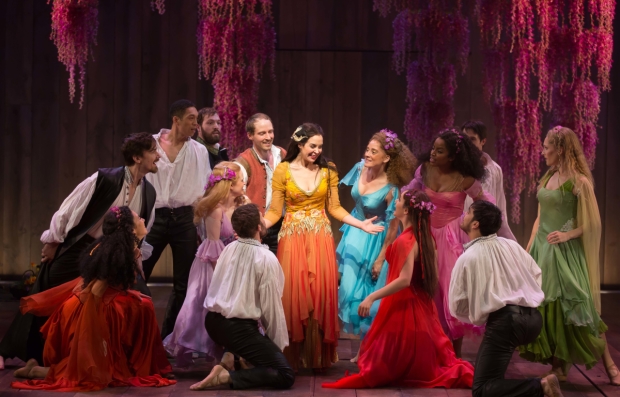Love and Hope Inspire the World of Camelot

(© Scott Suchman)
Camelot is an underrated musical, a show that is often treated as a collection of memorable songs loosely draped around the shoulders of Britain's perhaps historical, certainly mythological King Arthur.
Fortunately, the Shakespeare Theatre Company has brought Camelot back to life in a sensitive and visually stunning production. With book and lyrics by Alan Jay Lerner and music by Frederick Loewe, Camelot tells the story of a famous king who led Britain against Saxon invaders in the late fifth and early sixth centuries, a fable that was later adapted in T.H. White's book The Once and Future King, which was later adapted into the musical. Much of Arthur's story deals with the love triangle involving Arthur, his wife, Guenevere, and Sir Lancelot du Lac, a Frenchman who came to England to become one of the knights of Arthur's Round Table.
The first act serves to outline how perfect Camelot is. Its weather is never too hot or too cold ("the rain may never fall till after sundown"); its king is an intelligent ruler who stands for justice and peace, refusing to support the popular belief that might makes right. But in the second act, even Arthur has to admit that there is trouble in paradise. Guenevere and Lancelot fall in love, and there is nothing anyone can do to make them give up that love. In addition, Arthur's bastard son, Mordred, comes to Camelot to claim by force the kingdom he believes is rightly his.
Ken Clark gives a muscular performance as Arthur, using his warm tenor to win the audience over with his first song, "I Wonder What the King Is Doing Tonight?" Clark's Arthur is charmingly naive as a young man, but Clark knows how to shade the character, making him grow increasingly demanding of himself as he ages, every year desiring to be a more perfect — but still utterly charming — king.
Alexandra Silber is delightful as Guenevere. With her warm lyric soprano, she adds little trills to Loewe's music. Even when her character is entranced by Lancelot, Silber manages to make Guenevere's mature love for her husband credible. Nick Fitzer provides a good deal of the comic relief as Lancelot, highlighting the character's stuffiness and overflowing self-admiration. But gradually, with his strong, gentle voice and engaging manner, Fitzer's Lancelot wins not only the heart of Guenevere but also the approval of Arthur and the court. Ted van Griethuysen lends a voice of reason to the role of Merlyn, the wizened court magician and Arthur's mentor. Patrick Vaill plays the evil Mordred with vicious flair, the polar opposite of the noble Arthur.
Director Alan Paul has made sure that this Camelot doesn't feel like a history lesson. He emphasizes the modernity of his characters by showing their determination to follow their feelings over all else.
Scenic designer Walt Spangler uses floor-to-ceiling gray wooden planks to create a space for all the action in Camelot. A few set pieces suggest details: a huge tree limb to represent the king's forest; a table with three glasses suggests the king's chamber. Lighting designer Robert Wierzel adds color to give personality to those places: silver for the tree limb, red for the bedroom where Lancelot and Guenevere are discovered together. Music director James Cunningham leads an 11-person orchestra, crisply delivering Loewe's varied and imaginative score. Voice coach Lisa Beley's work with the cast has ensured that Lerner's sometimes funny, often sardonic lyrics are heard clearly.
Although the homage to the chivalry of Act 1 is followed by the negativity of Act 2, there is a final scene between Arthur and a child that suggests mankind's desire for order and optimism will return. The way Paul and his actors play this exchange makes it feel like the possibility for goodness and hope is not just in Arthur's kingdom, but in the greater world.










